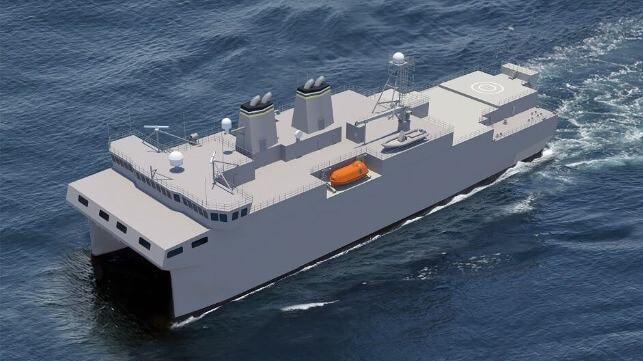Austal USA's Switch to Steel Yields $3B T-AGOS Shipbuilding Contract

Alabama-based shipbuilder Austal USA has added to the order backlog for its newly-inaugurated steel production line with a $3 billion contract for seven ocean surveillance ships for the U.S. Navy.
The T-AGOS fleet provides anti-submarine passive and active surveillance capability using towed-array sonar. These special-purpose ships are operated by Military Sealift Command with civilian crews, gathering underwater acoustical signals for the service's Integrated Undersea Surveillance System (IUSS).
Subcontractors include L3Harris, TAI Engineering, Noise Control Engineering and neighboring shipbuilder Thoma-Sea.
“The Austal USA team is excited to support the U.S. Navy with this critical program. We have enjoyed our long partnership with the Navy in delivering aluminum ships and we are honored to continue that relationship in delivering high-quality steel ships,” Austal USA President Rusty Murdaugh said.
The Pentagon has invested heavily in expanding Austal's capabilities with a new steel production line, providing $50 million in matching funds. It has followed up by awarding Austal several smaller contracts to kickstart the line, including U.S. Navy Towing and Salvage ship (T-ATS) and Auxiliary Floating Drydock Medium (AFDM). Austal also secured a rebid contract for follow-on hulls for the U.S. Coast Guard Offshore Patrol Cutter (OPC) program.

that matters most
Get the latest maritime news delivered to your inbox daily.
The awards come despite a past accounting scandal connected to the Independence-class littoral combat ship (LCS) program, which recently resulted in criminal charges for three former Austal USA executives. The yard has appointed an experienced former prosecutor to head its in-house legal team and oversee compliance.
Austal USA continues to build Independence-class littoral combat ships and expeditionary fast transports in aluminum, but for future orders, the Navy is re-emphasizing steel. It is the second time: in the late 1980s, the Navy determined that all 263 of the ships it had built with aluminum superstructures had cracking issues in the heavy-duty rigors of naval service, and decided to phase out the lightweight material in shipbuilding. 30 years later, it encountered similar issues with the all-aluminum Independence LCS: nearly half the class developed a serious cracking problem above the waterline, requiring sea state and speed restrictions for affected ships until repairs could be made with thicker plate. The expeditionary fast transport has reportedly experienced similar vulnerabilities.
